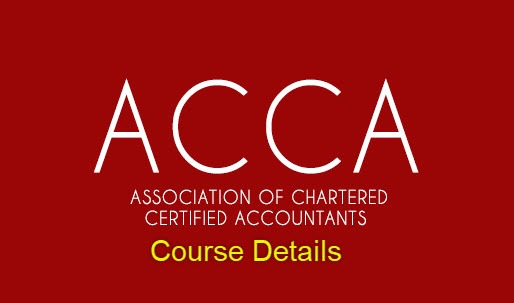
The Association of Chartered Certified Accountants (ACCA) is a globally recognized professional accounting body that offers a prestigious qualification, equipping individuals with the skills and knowledge needed for a successful career in finance, accounting, and business. The ACCA qualification is highly respected in the finance industry and provides a pathway to numerous career opportunities worldwide. In this comprehensive guide, we will delve into the intricate ACCA course details, providing insights into its structure, subjects, benefits, and the promising career prospects it offers.
ACCA Course Structure
The ACCA qualification is a well-structured and comprehensive program designed to prepare individuals for a successful career in finance, accounting, audit, and related fields. The program is divided into several key components, each building on the previous level’s knowledge and skills:
- Foundation Level: The ACCA journey typically begins with the Foundation level, which includes two qualifications:
- Introductory Certificate in Financial and Management Accounting: This serves as an entry point for individuals with minimal accounting knowledge.
- Intermediate Certificate in Financial and Management Accounting: Building on the introductory level, this qualification provides a deeper understanding of accounting principles.
- Applied Knowledge: The Applied Knowledge level builds a solid foundation in accounting and finance concepts. It includes three papers:
- Accountant in Business (AB): This paper focuses on understanding the business environment and the role of accounting.
- Management Accounting (MA): MA delves into management accounting techniques and their application in decision-making.
- Financial Accounting (FA): FA covers the principles and regulations governing financial accounting.
- Applied Skills: The Applied Skills level builds on the knowledge gained in the Applied Knowledge level and consists of six papers, divided into two modules:
- Module 1: Includes Corporate and Business Law (LW), Performance Management (PM), and Taxation (TX). LW covers legal aspects, PM focuses on performance management techniques, and TX deals with taxation principles.
- Module 2: Comprises Financial Reporting (FR), Audit and Assurance (AA), and Financial Management (FM). FR explores financial reporting standards, AA delves into audit procedures, and FM deals with financial management techniques.
- Strategic Professional Level: The Strategic Professional level is the pinnacle of the ACCA qualification, preparing individuals to become strategic finance professionals. It consists of two mandatory papers:
- Strategic Business Leader (SBL): SBL emphasizes leadership and strategy, preparing candidates for senior management roles.
- Strategic Business Reporting (SBR): SBR focuses on advanced financial reporting and analysis.
Additionally, students choose two out of four optional papers to specialize in areas that align with their career goals. The optional papers include:
- Advanced Financial Management (AFM): AFM deals with advanced financial management techniques.
- Advanced Performance Management (APM): APM explores advanced performance management tools and strategies.
- Advanced Taxation (ATX): ATX covers advanced taxation principles and regulations.
- Advanced Audit and Assurance (AAA): AAA delves into advanced audit and assurance procedures.
- Ethics and Professional Skills Module: Throughout the ACCA journey, candidates are required to complete the Ethics and Professional Skills module, which focuses on enhancing ethical and professional skills, ensuring that ACCA professionals maintain the highest standards of integrity and professionalism in their careers.
- Practical Experience Requirement (PER): In addition to passing the exams, ACCA students must gain practical experience, typically taking around three years. This real-world exposure ensures that candidates can apply their knowledge effectively in a professional setting.
Benefits of Pursuing ACCA
Pursuing an ACCA qualification offers a multitude of benefits, making it an attractive choice for individuals looking to embark on a successful career in finance and accounting:
- Global Recognition: ACCA is recognized and respected worldwide, opening doors to international career opportunities and ensuring that your skills are valued on a global scale.
- Versatility: ACCA professionals can work in various sectors, including finance, accounting, audit, tax, consulting, and even entrepreneurship, providing a wide range of career choices.
- High Earning Potential: ACCA-qualified individuals often enjoy competitive salaries, given their expertise in finance and accounting, which is highly sought after by employers.
- Continuous Learning: ACCA promotes lifelong learning, ensuring that professionals stay updated with industry trends, regulations, and emerging technologies.
- Networking Opportunities: ACCA provides a platform for networking with industry leaders, fellow professionals, and like-minded individuals through events, seminars, and conferences.
- Career Progression: ACCA equips individuals with the skills needed for leadership roles, career advancement, and the ability to take on senior management positions.
- Flexibility: ACCA offers a flexible study structure, allowing candidates to study at their own pace, balance work and study commitments, and choose the order in which they complete the exams.
Career Prospects with ACCA
An ACCA qualification opens doors to a wide range of promising career opportunities, including:
- Chartered Accountant: Many ACCA professionals work as chartered accountants, providing financial expertise to organizations, managing audits, and ensuring compliance with financial regulations.
- Financial Analyst: ACCA-qualified individuals often become financial analysts, offering insights and recommendations for investment decisions.
- Audit and Assurance Professional: ACCA prepares individuals for auditing roles, where they review financial records and assess compliance with regulations.
- Management Consultant: ACCA professionals can work as management consultants, advising organizations on strategic financial decisions and business improvements.
- Finance Manager: With advanced financial knowledge, ACCA-qualified individuals are well-suited for finance manager roles, overseeing an organization’s financial operations, budgeting, and financial reporting.
- Tax Advisor: Taxation is a specialized field where ACCA professionals can excel, helping individuals and organizations navigate complex tax regulations and minimize tax liabilities.
- Entrepreneurship: Some ACCA-qualified individuals choose to start their businesses or consult as financial experts for startups and small businesses, leveraging their financial expertise.
Conclusion
In conclusion, the ACCA qualification is a prestigious and globally recognized pathway to a successful and fulfilling career in finance, accounting, and business. Its well-structured course, esteemed recognition, and versatile career opportunities make it an attractive choice for individuals aspiring to excel in the finance industry. Whether you are a recent graduate or a seasoned professional, ACCA can be your passport to a successful and rewarding career in finance, accounting,
